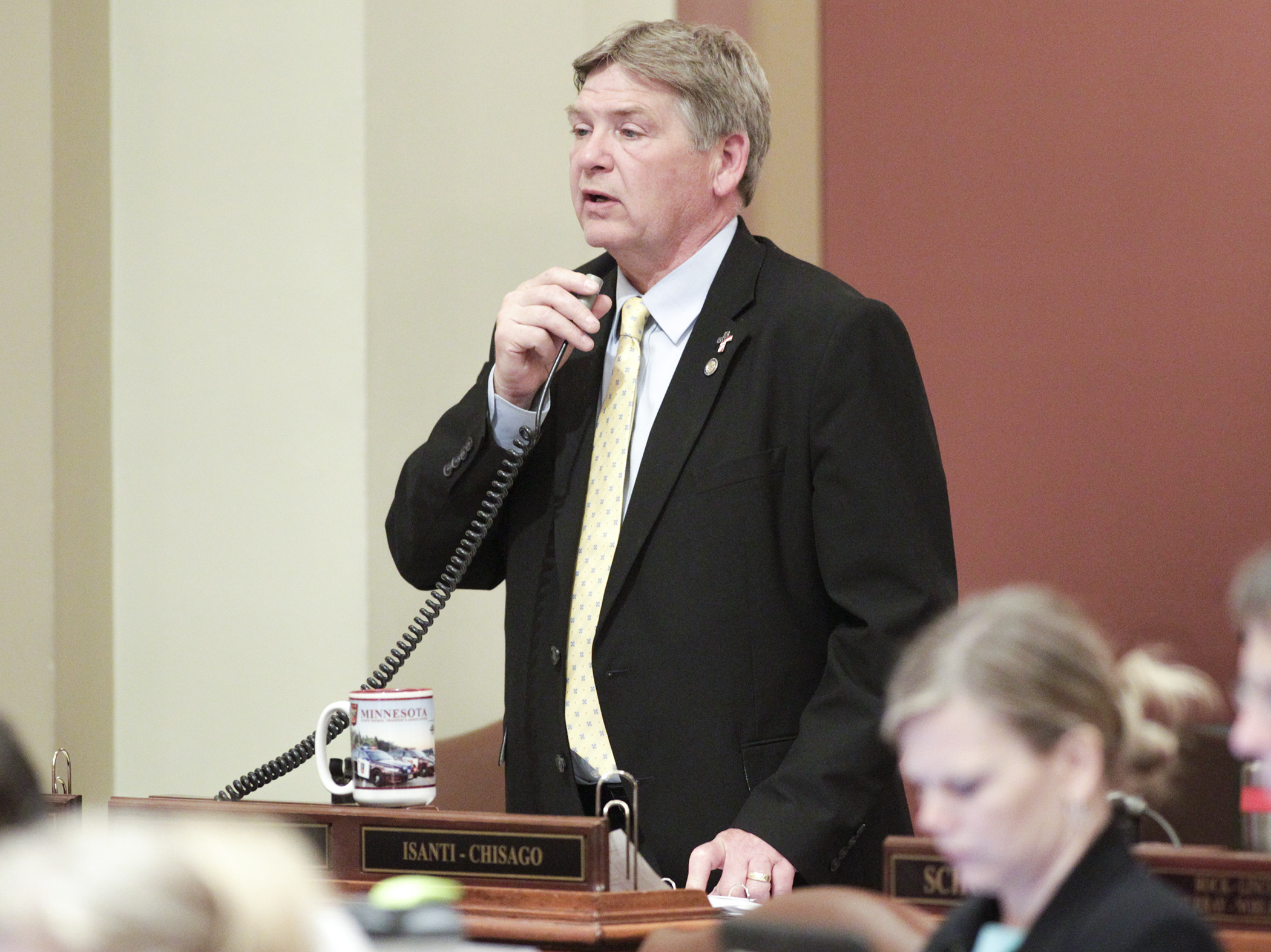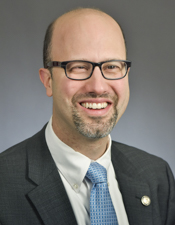Omnibus public safety bill with increased freeway protester penalties passed by House

Supporters say a bill ratified late Tuesday would help ensure Minnesotans safety and security. Opponents are highly critical of one provision.
Ultimately, the omnibus public safety and security finance bill was passed 92-35 by the House.
“In addition to making targeted investments in needed areas, our legislation implements critical reforms to protect law enforcement, keep our roads safe, and crack down on dangerous sex offenders. I am proud to [sponsor] this bill and look forward to working with the Senate to produce a final product the governor can find agreeable,” Rep. Brian Johnson (R-Cambridge), chair of the House Public Safety and Security and Finance Committee said in a statement about HF2856.
As amended, the bill heads to the Senate, where Sen. Warren Limmer (R-Maple Grove) sponsors that body’s omnibus judiciary and public safety package.
However, those provisions — along with all the other supplemental funding packages — have been rolled into one all-encompassing omnibus bill, SF3656.
“Public safety is usually a bipartisan issue in this chamber and more and more it’s becoming partisan and that’s really unfortunate,” said Rep. Debra Hilstrom (DFL-Brooklyn Center). “… There are some really great policy provisions, but the governor made it very clear that he’s not going to sign a bill with controversial policy provisions in the bill.”
Freeway, airport protester penalties
Perhaps the most contentious policy change would increase the penalty in statute from a misdemeanor to a gross misdemeanor for someone who intentionally obstructs traffic “entering, exiting, or on a freeway or entering, exiting, or on a public roadway within the boundaries of airport property with the intent to interfere with, obstruct, or otherwise disrupt traffic.” Restricting passenger access would also be added to state statute regarding unlawful interference with transit.
Rep. Nick Zerwas (R-Elk River) said the language is not about silencing voices, rather to deter illegal behavior.
“You might think you have a First Amendment right to pull your Buick across three lanes of traffic. … That’s already a criminal act,” he said. “What the language in this bill would do is say that that activity where you block a freeway, when you block access to an airport, when you march in front of a light-rail train and put your arms in PVC pipe and handcuff each other together and then put bike locks around each other’s neck to the fence. That activity is so dangerous that it deserves to have an extra criminal penalty.”
Rep. Dave Pinto (DFL-St. Paul) unsuccessfully offered an amendment to remove the language.
“We’ve heard no complaints from law enforcement, no complaints from the cities involved that somehow the tools that they already have are insufficient,” he said during the ensuing nearly 90-minute debate. “This is being pushed as part of this systematic agenda to punish those who are attempting to raise the inequities that they see.”
Added Rep. Ilhan Omar (DFL-Mpls): “What you are doing is stifling the freedom of speech; what you are doing is instilling fear in people so that they go away. … This country is built on people rebelling, people showing dissent, and people urging their government to do the right thing. That’s why we encourage protests.”
House Majority Leader Joyce Peppin (R-Rogers) said the U.S. Supreme Court has consistently ruled that governments can put protest locale restrictions in place. “We want to make sure people are able to speak out in this country, but there’s nothing unreasonable about us making sure they’re doing it in a way that doesn’t harm other people.”
“If you’re standing out on a freeway or closing an airport, I don’t care if you’re pro-life, pro-Second Amendment, if you’re fighting for indigenous rights or racial justice, I don’t give a rip,” said Rep. Pat Garofalo (R-Farmington). “You’re standing in the middle of a freeway. You’re closing down an airport. It doesn’t matter what the cause is. You’re shutting down critical important transportation corridors that affect commerce and save lives.”
Lamenting no guns
In a statement, Pinto expressed disappointment at the lack of gun safety bills in the final package, including his bills that would require a buyer background check for almost every transfer of a firearm in the state, and one that would permit law enforcement and family members to petition a court to prohibit someone from possessing a firearm for between six months and two years if they pose a “significant danger” to themselves or others.
“Ninety percent of Minnesotans, including a majority of gun owners, want criminal background checks on gun purchases. Minnesotans are demanding that we do more to keep guns out of the hands of dangerous people, but this session Republicans have blocked every effort to do that. That is deeply disappointing to me, and to thousands of families throughout our state who have been touched by tragic gun violence and expect action,” he said.
Johnson noted member concerns were raised when each proposal was heard March 1. Those had not been addressed when the bill was tabled by the House Public Safety and Security Policy and Finance Committee March 20.
“There is a gaping hole in this bill where those provisions should be. I cannot, in good conscience, vote for a bill that doesn’t address the most pressing public safety issue of our time,” said House Minority Leader Melissa Hortman (DFL-Brooklyn Park).
Select policy provisions
Some provisions included in the omnibus public safety and security finance bill would:
- expand criminal vehicular homicide and criminal vehicular operation crimes to include when someone negligently operates a motor vehicle while operating a cell phone or other electronic device other than in a hands-free mode and causes death or bodily harm to another person;
- require predatory offender registration for persons who receive stays of adjudication for sex offenses;
- create felony-level criminal sexual conduct offenses for school employees and independent contractors who engage in certain inappropriate relationships with students between the ages of 16-21;
- make an adult who was in a position of authority over a 16- or 17-year-old within the past 120 days subject to criminal penalties for having a sexual relationship with the juvenile;
- extend the definition of position of authority to cases where an adult “assumed” authority over a victim;
- establish an intensive probation program for all felony sex offenders who are not committed to the commissioner of corrections following their convictions;
- require a 25-year conditional release term for people convicted of felony sexual misconduct who are committed to the Corrections Department;
- increase the fine from $500 to $750 for first-time patrons of prostitution and create a felony penalty for someone convicted of patronizing a prostitute within 10 years of a prior conviction;
- make it illegal under Minnesota’s fifth-degree criminal sexual conduct code to intentionally touch the clothing area over someone’s buttocks;
- create a Task Force on Missing and Murdered Indigenous Women to, in part, recommend ways to reduce and end violence against indigenous women;
- establish a working group to examine crimes against vulnerable adults;
- increase the penalty for inflicting demonstrable bodily harm while assaulting a peace officer from a gross misdemeanor to a felony;
- enhance criminal penalties for assaulting firefighters or medical personnel; and
- before a DWI offender could be re-licensed to drive, use of an ignition interlock system for one year would be required if it is a second impaired driving incident in 10 years or a third lifetime offense. Two years of ignition interlock usage would be required for a person whose license was revoked for either of those reasons, and the person had an alcohol concentration of twice the legal limit or refused to submit a required breath, blood or urine sample. An ignition interlock manufacturer, installer or servicer would be required to pay any towing or repair costs incurred by the user when a device failure results in the vehicle being unable to start.
Fiscal changes
The House bill contains just under $7.2 million for the current biennium that ends June 30, 2019. Of the spending, nearly $3.67 million would be directed to the Guardian ad Litem program in Fiscal Year 2019 for 45.5 full-time equivalent positions to help comply with state and federal mandates to represent the best interests of children in juvenile and family court proceedings.
Other spending includes $1.5 million to provide supervision to offenders placed on intensive probation and $850,000 for the Board of Public Defense for more staffing related to additional work expected to occur due to proposed policy changes in the bill.
View the spreadsheet.
However, it does not contain $7.8 million for the Corrections Department to cover its offender health care contract. By law, the department must provide health care for inmates, and, sans additional funding, department officials said money would likely be shifted from treatment areas.
Because the department was negotiating a new contract during last year’s budget-setting session, department officials were told to finish negotiations with the understanding the needed funds would be appropriated this year. The amount is $3 million lower than last year’s projected request.
Also missing is $7.86 million sought by the department due to a projected prison population increase that is expected to result in more beds being rented in county jails due to need. Money requested for additional scientists at the Bureau of Criminal Apprehension to reduce drug evidence turnaround time from 120 days to 30 days is also absent.
Related Articles
Search Session Daily
Advanced Search OptionsPriority Dailies
Ways and Means Committee OKs proposed $512 million supplemental budget on party-line vote
By Mike Cook Meeting more needs or fiscal irresponsibility is one way to sum up the differences among the two parties on a supplemental spending package a year after a $72 billion state budg...
Meeting more needs or fiscal irresponsibility is one way to sum up the differences among the two parties on a supplemental spending package a year after a $72 billion state budg...
Minnesota’s projected budget surplus balloons to $3.7 billion, but fiscal pressure still looms
By Rob Hubbard Just as Minnesota has experienced a warmer winter than usual, so has the state’s budget outlook warmed over the past few months.
On Thursday, Minnesota Management and Budget...
Just as Minnesota has experienced a warmer winter than usual, so has the state’s budget outlook warmed over the past few months.
On Thursday, Minnesota Management and Budget...
